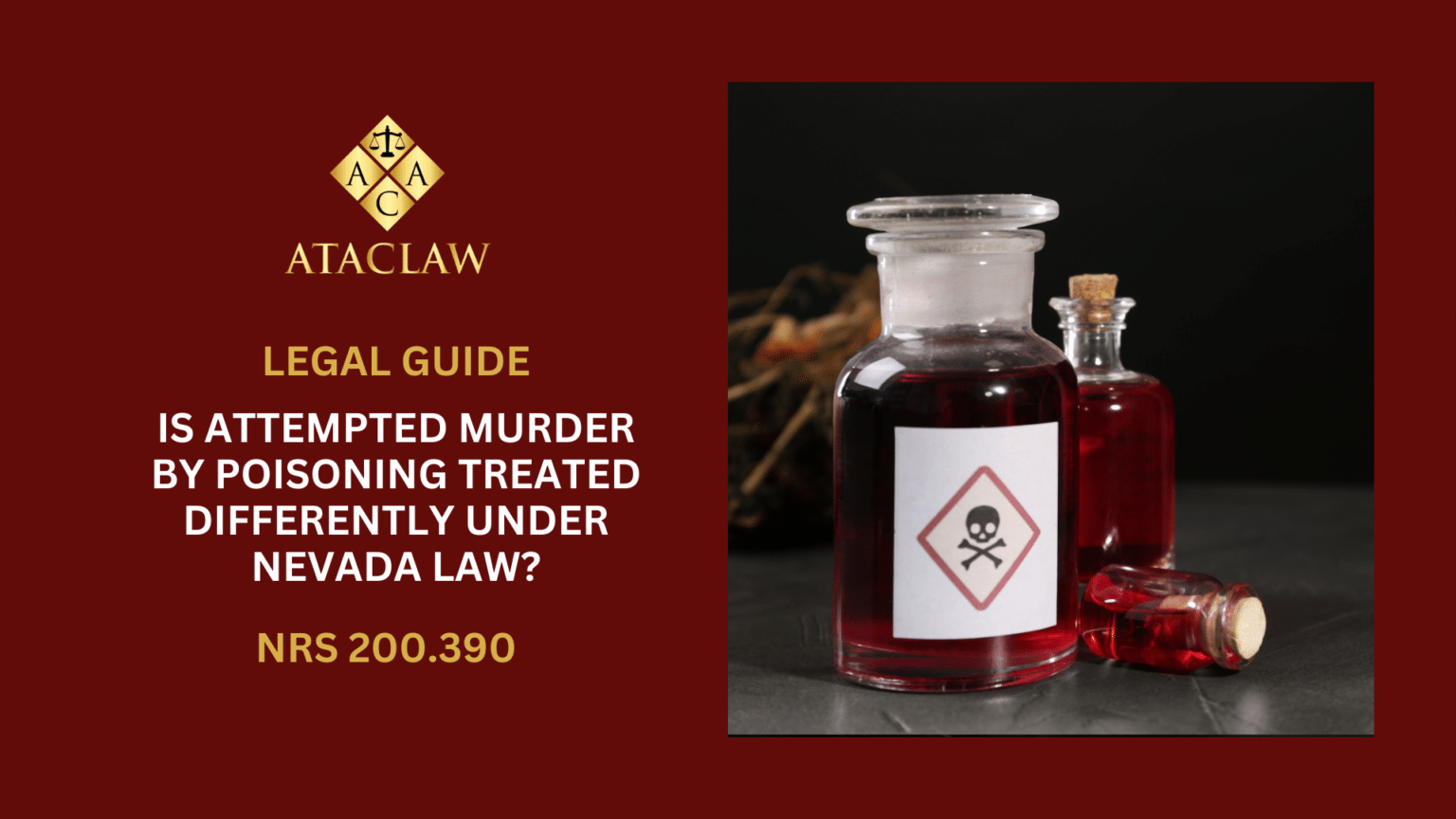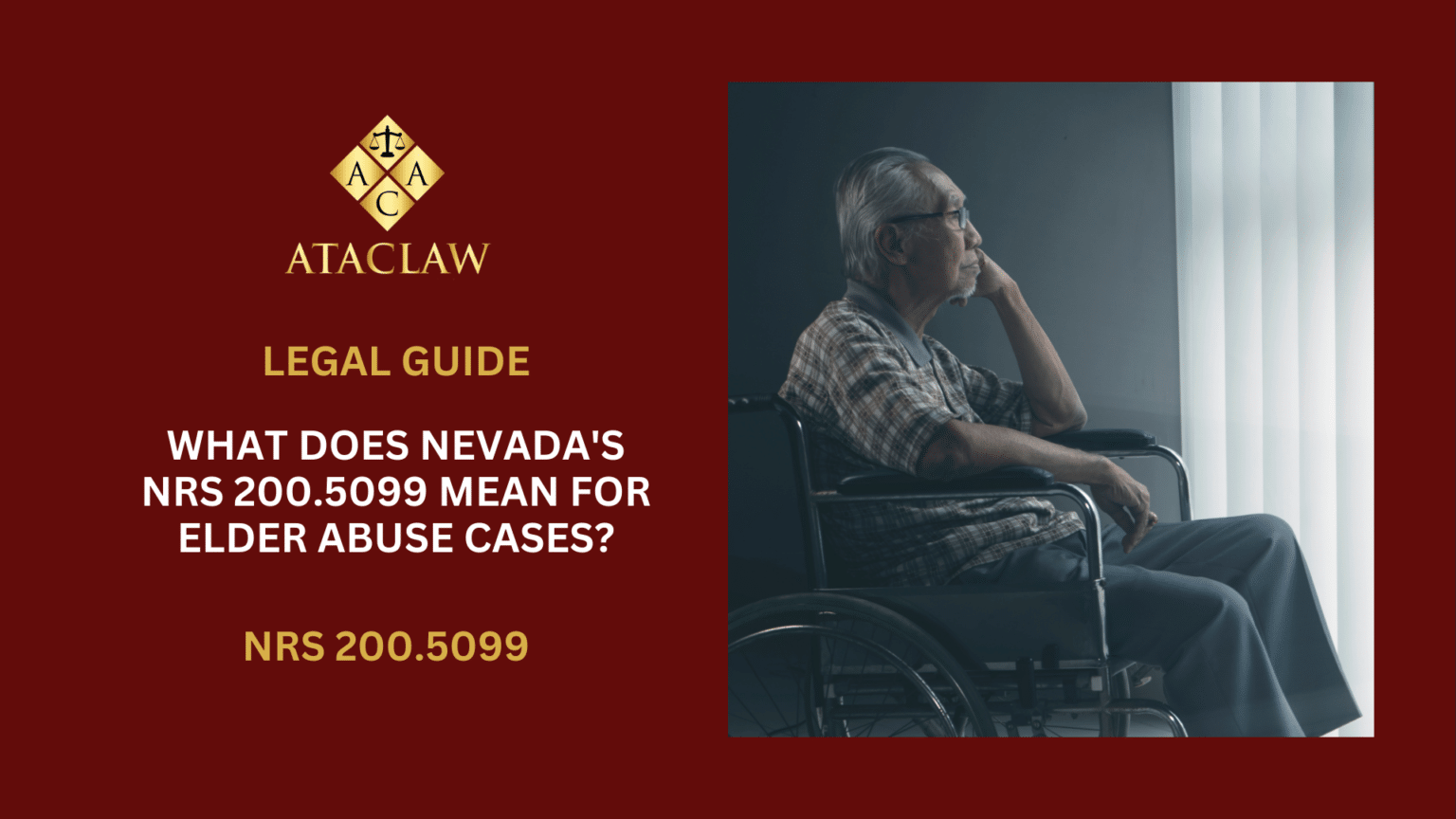In Nevada’s juridical landscape, certain offenses carry significantly steeper penalties, especially when they involve nuanced circumstances. A prime example is attempted murder by poisoning – legislated under NRS 200.390. This specific act is subjected to possibly more severe repercussions compared to other forms of attempted murder. It’s a reality that could see the accused facing as dire a sentence as life imprisonment. However, facing charges doesn’t necessarily mean the end of the road. Here at ATAC LAW, we want you to understand the gravity of these accusations while also recognizing the potential for a favorable resolution.
How Does Nevada Law Define “Attempted Murder by Poisoning”?
Imagine someone purposely tries to use poison to hurt another person, with the goal of ending that person’s life. Here, “poison” means anything that’s dangerous and could seriously harm someone if they eat, drink, or touch it. This type of crime is like other kinds of attempted murder, but the big difference is the use of poison. The law in Nevada is very clear: if someone didn’t actually plan to kill another person, they shouldn’t be charged with this crime.
Let’s illustrate to understand better: Let’s say Lisa from Las Vegas is cooking dinner and accidentally picks up a bottle of poisonous liquid instead of cooking oil. She doesn’t notice and uses it in her meal. Her friend eats the food, gets very sick, and has to go to the hospital. Even though this was a terrible accident, it wasn’t on purpose. So, if there’s no proof that Lisa wanted to cause harm, she should not be charged with attempted murder by poisoning.
Now, if her friend had tragically passed away because of the poison, Lisa might face more serious charges. However, if there was no intention to cause harm, she shouldn’t be charged with attempting to take someone’s life. At worst, she might face charges for being careless and causing an accident, also known as involuntary manslaughter.
In short, in Nevada, someone can only be charged with “attempted murder by poisoning” if they really meant to hurt someone with poison. Understanding the difference between a real intent to harm and a simple mistake is important for anyone dealing with these serious accusations.
What Are the Key Defenses Against Attempted Murder by Poisoning Charges?
Facing charges for attempting to commit murder with poison is a grave situation, fraught with complexities that hinge on the specific details of the incident. A defense attorney’s strategy may leverage several pivotal arguments to challenge such accusations:
- Absence of Intent to Harm: Central to the defense is the argument that the accused did not intend to cause death. According to Nevada statute NRS 200.390, conviction hinges upon proof of intent. If it can be demonstrated that the event was an accident or a misunderstanding without any malicious intent, then the charges should ideally be dismissed.
- Disputing the Presence of Poison: Another critical defense is questioning the nature of the substance involved. If the material in question is not toxic, then the basis for an “attempted murder by poisoning” charge collapses. Validating the non-toxic nature of the substance ingested or administered can absolve the accused of these severe charges.
- Challenging the Evidence: The burden of proving guilt beyond a reasonable doubt lies with the prosecution. By highlighting the insufficiency, unreliability, or inaccuracy of the prosecution’s evidence, a defense attorney may significantly undermine the case against the defendant, potentially leading to dismissal.
- Claiming Self-Defense: In certain scenarios, self-defense can be a viable argument. However, this defense is contingent upon the defendant’s perception of an immediate threat to their bodily safety.
Let’s illustrate with a hypothetical scenario, replacing the names from the example given:
Example: Sarah in West Vegas finds herself in a perilous situation as her partner, Alex, brandishes a knife threateningly. In a bid for self-preservation amidst fear of serious harm, Sarah reaches for a nearby can of insect repellent and sprays it towards Alex, inadvertently causing severe distress. Subsequently, Sarah faces charges. However, her actions might be justified under self-defense, provided she acted under the genuine threat of imminent harm.
It’s crucial to underscore that self-defense justifies immediate responses to threats. For instance, if Alex had de-escalated the situation and sheathed the knife, any retaliatory act by Sarah much later, such as tampering with food or drink, wouldn’t qualify as self-defense due to the absence of an immediate threat.
What Are the Legal Consequences of Poison-Related Offenses in Nevada?
Nevada law classifies offenses involving poison with severe penalties, underscoring the gravity of such actions. Understanding the distinctions between the types of offenses and their respective repercussions can provide insight into how Nevada’s legal system addresses these serious crimes.
1. Consequences of Attempting to Commit Murder with Poison:
Committing an attempt on someone’s life using poison is considered a category A felony within the state. Those found guilty face severe penalties, including:
- A possibility of spending life in Nevada State Prison, with parole consideration after a minimum of 5 years served, or
- A minimum of 15 years in Nevada State Prison, also with the possibility of parole after 5 years.
2. Penalties for Attempted Murder without the Use of Poison:
When an attempt on life does not involve poison, the offense falls under a category B felony, encompassing a broader range of consequences. Convicted individuals can expect:
- Incarceration ranging from 2 to 20 years. In instances where the victim is 60 years of age or older, or if the assailant utilized a deadly weapon, the judge has the discretion to double the penalty.
3. Punishments for Murder Committed with Poison:
The act of willfully ending someone’s life by administering poison is met with the harshest penalties, being a category A felony. Depending on the circumstances, the court may impose:
- The death penalty,
- Life imprisonment without the possibility of parole,
- Life imprisonment with the possibility of parole after serving 20 years, or
- A 50-year prison term with eligibility for parole after 20 years.
4. Sentencing for Involuntary Manslaughter Involving Poison:
In cases where an individual’s death results from negligence with poison but without malicious intent, the crime is classified as a category D felony. The legal consequences include:
- A prison sentence ranging from 1 to 4 years, and
- Potentially, fines reaching up to $5,000.
Nevada’s penal system meticulously delineates the repercussions for offenses involving poison, reflecting the seriousness with which it treats such acts. These laws serve both as a deterrent against the misuse of poison and as a framework for adjudicating cases with fairness and precision. Understanding these legal distinctions and penalties is crucial for anyone navigating or interested in the intricacies of criminal law in Nevada.
For further legal assistance and to discuss your case with an expert, don’t hesitate to contact ATAC LAW.




